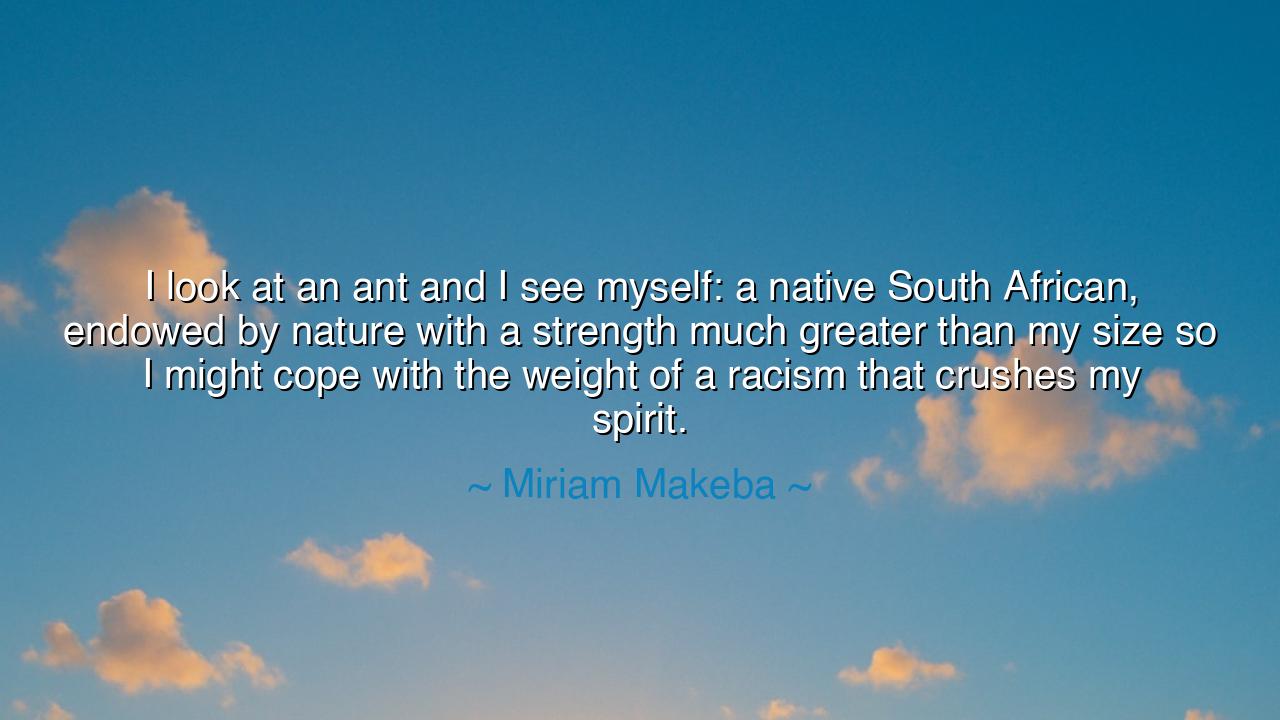
I look at an ant and I see myself: a native South African
I look at an ant and I see myself: a native South African, endowed by nature with a strength much greater than my size so I might cope with the weight of a racism that crushes my spirit.






Miriam Makeba, the voice of Africa and a warrior through song, once spoke with piercing honesty: “I look at an ant and I see myself: a native South African, endowed by nature with a strength much greater than my size so I might cope with the weight of a racism that crushes my spirit.” In these words, she gave to the world both a confession and a revelation: that even the smallest of beings, despised and overlooked, may possess the hidden power to endure immense burdens. And so she saw in the humble ant the reflection of her people, and of herself — underestimated in size, but immeasurable in strength.
The meaning of this saying is profound. The ant, though tiny, carries loads many times heavier than its own body. It is tireless, enduring, uncomplaining, pressing forward despite its smallness. Makeba identifies with this image because the oppression of apartheid sought to render her, and all her people, insignificant — to crush their spirit beneath the weight of institutionalized racism. Yet, like the ant, she found within herself a resilience far greater than what the world imagined she could bear. Her strength was not in physical power or political authority, but in her soul’s refusal to be broken.
The origin of her words lies in the brutal history of apartheid South Africa. Stripped of rights, dignity, and voice, Black South Africans were treated as less than human, as though their existence were a burden. Makeba herself was exiled for her music, her passport revoked, her return forbidden. Yet through song she carried her nation’s cry to the world, bearing the weight of injustice as the ant carries its load. What should have crushed her spirit instead became her testimony, her art, her endurance.
History has seen this pattern before. Think of the Hebrew slaves in Egypt, bowed beneath the might of Pharaoh, yet sustained by a hidden strength that endured generations of bondage. Or of the African-American slaves in America, whose songs carried both sorrow and hope, transforming suffering into resilience that gave birth to movements of liberation. In every age, the oppressed have borne loads that should have destroyed them, yet like the ant, they endured through strength invisible to their oppressors.
Makeba’s vision also reveals a paradox: that greatness often wears the cloak of smallness. The mighty often underestimate the weak, thinking size is the measure of power. But nature teaches otherwise. The ant, though despised, builds empires beneath the earth. The oppressed, though crushed, rise with dignity and shake the foundations of nations. In this, Makeba shows us that the human spirit, when anchored in truth and justice, is capable of more than anyone believes.
The lesson is timeless: do not despise your smallness, nor despair when the weight of the world presses upon you. Within you lies a strength greater than you imagine, placed there by nature, by spirit, by God. You may not be mighty in the eyes of men, but like the ant, you were created to endure burdens and to move mountains grain by grain. Look upon your struggles not as proof of weakness, but as the forge of hidden power.
Therefore, my children, remember Miriam Makeba’s words: “I look at an ant and I see myself.” When life seeks to crush your spirit, call upon the strength within you that is greater than your size. Walk steadily, like the ant, bearing your load with dignity. Transform suffering into song, and exile into testimony. In this way, you will not only endure, but inspire others, proving that the smallest can be the strongest, and that no weight, however great, can silence the spirit that refuses to yield.






AAdministratorAdministrator
Welcome, honored guests. Please leave a comment, we will respond soon